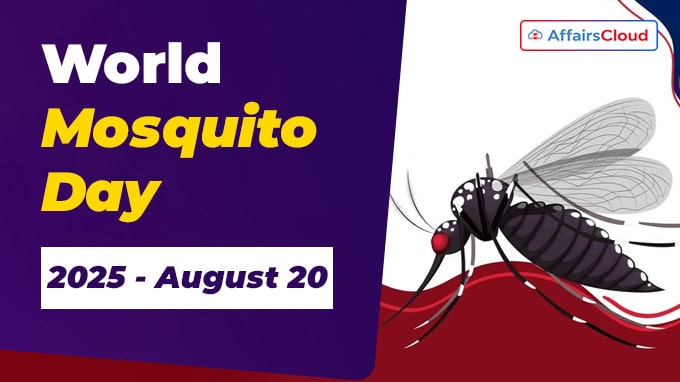 World Mosquito Day (WMD) is observed globally every year on 20th August to commemorate the discovery by British doctor Sir Ronald Ross in 1897 that female Anopheles mosquitoes transmit malaria between humans.
World Mosquito Day (WMD) is observed globally every year on 20th August to commemorate the discovery by British doctor Sir Ronald Ross in 1897 that female Anopheles mosquitoes transmit malaria between humans.
- Aim: The day raises awareness about mosquito-borne diseases, educates on mosquito control and preventive measures, and highlights ongoing research and interventions.
Exam Hints:
- What? World Mosquito Day 2025
- When? August 20, 2025
- Aim: Raise awareness on mosquito-borne diseases
- Discovery Commemoration: Sir Ronald Ross, 1897
- Nobel Prize: Received the Nobel Prize in Physiology or Medicine in 1902.
Significance:
Tribute : Since 1930, the London School of Hygiene & Tropical Medicine (LSHTM), United Kingdom(UK), organises an annual event on 20th August.
Commemoration:: On 20th August 1997, the Government of India (GoI) issued a commemorative postage stamp to mark the 100th anniversary of Ross’ discovery of Plasmodium oocytes.
Discovery of Malaria:
Malaria Parasite Identification: On 20th August 1897, Sir Ronald Ross discovered the malaria parasite in the stomach of female Anopheles mosquitoes in Secunderabad (Telangana, India).
Research Publication: Findings published in “On some peculiar pigmented cells found in two mosquitoes fed on malarial blood” in the British Medical Journal (BMJ), 18th December 1897.
Nobel Prize Recognition: He received the 1902 Nobel Prize in Physiology or Medicine, becoming the first Briton to be awarded for malaria research.
About Ronald Ross:
Early Life: Ronald Ross was born on 13th May 1857 in Almora, India (now in Almora, Uttarakhand, India).
Contributions : Developed mathematical models for malaria transmission; key work in epidemiology.
Honours: Elected Fellow of the Royal College of Surgeons (1901) and Royal Society of London; served as Vice President (1911–1913); received knighthood in 1911.
Ross Institute and Hospital for Tropical Diseases: Established in 1926, inaugurated at Putney Heath, London (UK) by the Prince of Wales, as a memorial and recognition of Ross’ work.
- He served as Director-in-Chief of the Institute from 1926 until his death in 1932.
About Malaria:
Overview: Malaria is a preventable and curable acute febrile disease caused by Plasmodium parasites, transmitted through bites of infected female Anopheles mosquitoes.
Causative Parasite Species: Five Plasmodium species cause malaria in humans, with Plasmodium falciparum and Plasmodium vivax posing the greatest threat.
Challenges Faced:
Outdoor Malaria Transmission: In Papua New Guinea, 80% of Anopheles bites occur outdoors, reducing Insecticide-Treated Nets (ITNs) and Indoor Residual Spraying (IRS) effectiveness.
Funding Shortfalls: Asia-Pacific faces a USD 478 million malaria funding gap; global shortfalls total USD 4.3 billion, threatening elimination efforts.
About APMEN (Asia Pacific Malaria Elimination Network)
Evolution: Launched in February 2009, integrates with APLMA (Asia Pacific Leaders Malaria Alliance) in 2017, to unite Asia-Pacific countries, technical experts, and institutions, combining political advocacy with technical excellence.
Call to Action : On 20th August 2025, APMEN emphasizes investment, innovation, and cooperation, urging agile, science-based efforts to address climate, funding, and vector challenges, advancing the goal of a malaria-free Asia-Pacific.
Impacts:
Global Health: Mosquito-borne diseases kill over one million people and infect up to 700 million annually, affecting nearly one in ten people worldwide.
Impacts in India:
- Reduction observed in dengue, chikungunya, lymphatic filariasis, and kala-azar, as per NCVBDC., according to the National Centre for Vector-Borne Diseases Control (NCVBDC).
- National Vector Borne Diseases Control Programme (NVBDCP): Administered by NCVBDC, it is the umbrella programme for vector-borne disease prevention and control.
- Epidemiological Progress: India reduced malaria cases and deaths by 97%, with 122 districts reporting zero cases and Ladakh, Lakshadweep, and Puducherry achieving zero indigenous cases by 2023.
- Strategic Approach: Guided by National Framework (2016) and National Strategic Plan (2023–2027) for malaria elimination by 2030.
World Malaria Day (WMD) :
The World Health Organization (WHO) observes WMD annually on April 25 to recognize global malaria control efforts and raise awareness.
- In 2025, the World Malaria Day theme is “Malaria Ends With Us: Reinvest, Reimagine, Reignite”.




